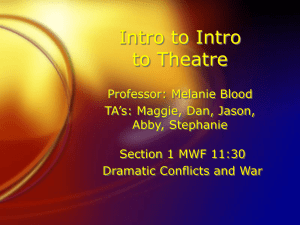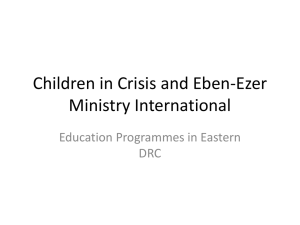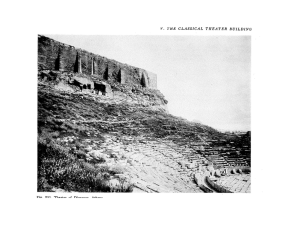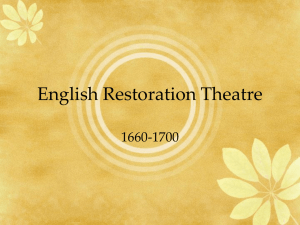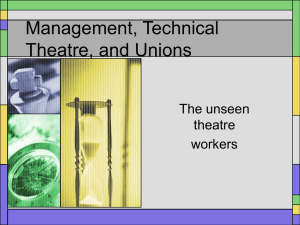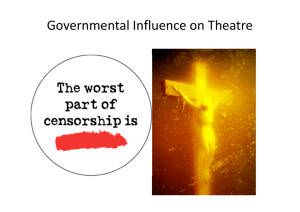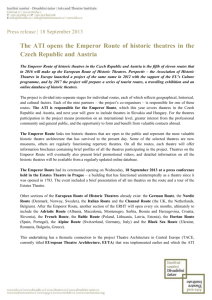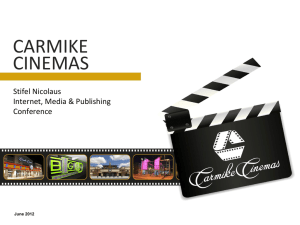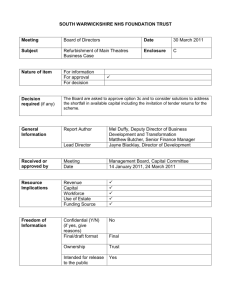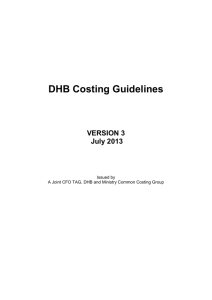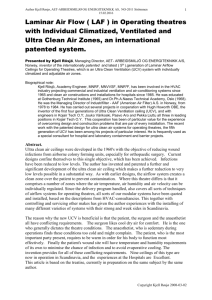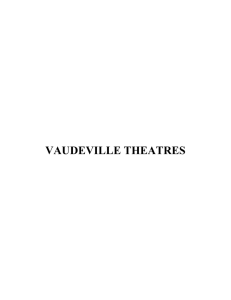ElectivesForumPresentation 17November2010
advertisement
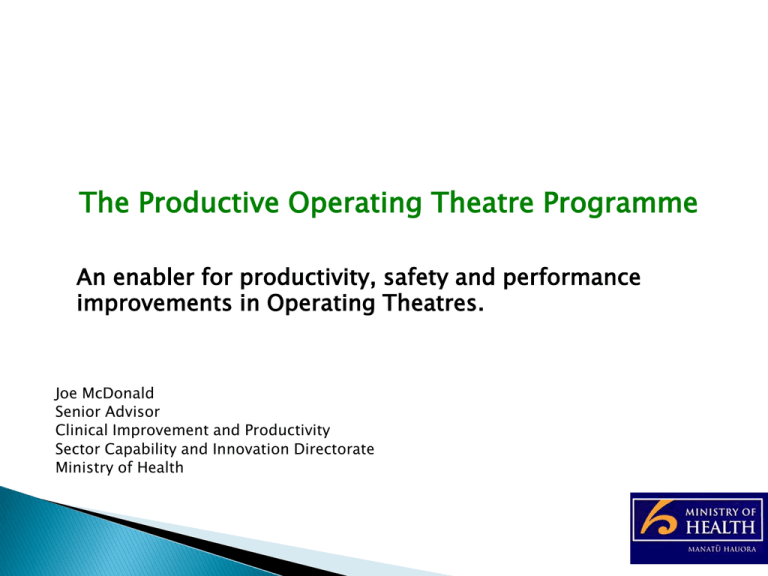
The Productive Operating Theatre Programme An enabler for productivity, safety and performance improvements in Operating Theatres. Joe McDonald Senior Advisor Clinical Improvement and Productivity Sector Capability and Innovation Directorate Ministry of Health Understand the real issues and challenges. Identified coproduction partners in the NHS and from industry Observing and enquiring in other high risk, lean organisations Terminal 5, Unipart – logistics Other healthcare settings, USA Generated and tested lots of ideas with the field test sites Test the idea in another environment / team with the Associate sites. Failure was learning Consolidate the learning, consider delivery mechanisms, marketing, launch Internal/external peer review. Frequent learning sets. Continual understand and reflect. Launch in Ongoing Sept 2009, ROI and followed by benefits regional realisation start-up capture events for NHS England Since April 2010 initiated 10 cohorts of training and implementation support to 90 of 174 acute trusts in NHS England. Delivered Master Training internationally in Wales , Scotland, and Northern Ireland and New Zealand. Coming to Australia, Canada and South Africa soon! UK NZ 174 trusts 21 DHBs Operating Theatres numbers 2,871 203 Average theatres per 16.5 9.6 £ 1,200 ($2,601) $ 1,680 2008/09 Trusts/DHBs Trust/DHB Running costs for an Operating Theatre per hour What is The Productive Operating Theatre? •Modular improvement programme for theatre teams •Systematic way to deliver significant improvements •A proven method of enabling frontline teams to transform the way they work •Concentrates on the HOW not the WHAT •Vehicle to deliver organisational objectives Effortless for everyone Great team communication Communications Training Staff Skill mix Quiet & smooth Equipment Fast but not rushed Attitudes/behaviours No glitches Safe, reliable care List Scheduling/utilisation Start/Finish Times Patient Prep Team working MDT Scheduling Session start up Patient preparation Patient Turnaround Handover Consumables and equipment Recovery (PACU) Leadership at Executive level Alignment with strategic direction Governance of the programme Continuous improvement / measurement Capability and knowledge Local expert with time allocated Clinical engagement Increase in the proportion of patients in recovery with a pain scores < 6 from 73% to 88%. Increase in the percentage of patients with temperature on arrival in recovery above 35.4°from 91% to 98%. Reduction in patient safety incidents and complications through improved team working and communication. Statistically significant increase in job satisfaction, team working and safety climate 63% reduction in average turnaround time. Start time delays reduced by average of 25 minute. 16% increase in touch time. Minimum £5K stock reduction per theatre. Minimum £9K recurring saving per theatre on theatre consumables per year. Per theatre Per DGH Reduced cancellations £ 23k £ 388k Improved utilisation & reduced over-runs £ 120k £1,980k Avoiding cost of defects £ 30.5k £503k Materials management £6k +£6k one-off £100k +£100k one-off Total £179.5 +£6k one-off £2,971k +£100k one-off 174 trusts in the NHS Total of 2,871 operating theatres, Average 16.5 theatres per trust Theatres represent Most theatres have had many 25-50% of most hospitals Improvement Projects often with income generation limited sustainable effect Theatres cost approximately £1000 – 1200 per hour (excluding medical personnel) Unstaffed hours still generate capital and estate costs Team-working Mean Score from SAQ before and after introduction of briefing and debriefing 80 70 60 50 before 40 after 30 20 10 0 Team work Climate p<0.05 Safety Climate Job Satisfaction Perceptions of Management Working Conditions Stress Recognition Team-working 7 number of sessions 6 4 22 unused, cancelled sessions 3 32 extra sessions 5 2 1 0 1 2 3 4 5 6 7 8 Over 8 weeks: w eek Cost of unused sessions £105,600 Cost of extra sessions >£153,600 Potential saving over 1 year >£660,000 Scheduling 100 98 96 Mean – 90% 94 Mean – 98% 92 90 88 Sep Aug 8 6 4 2 09 Sep- Oc t- 0 9 09 Aug- J ul-0 9 9 J un-0 May 09 Apr- 0 9 09 Mar- Feb09 9 J an-0 8 De c0 8 0 No v0 Potential saving in 1 year £510,400 10 Oc t- 0 8 Cost of extra sessions £81,664 12 08 Cost of unused sessions £31,746 Number of waiting list initiative sessions Sep- Over 8 weeks: Jul Jun May Apr Mar Feb Jan Dec Nov Oct Sep Aug Jul Jun May Apr 86 Hazardous (>1/1000) Ultra-safe (<1/100K) Regulated Health Care 100,000 Driving Total lives lost per year 10,000 1,000 Scheduled Airlines 100 10 Chartered Flights Bungee Jumping 1 1 10 European Railroads Chemical Manufacturing Mountain Climbing 100 1,000 10,000 100,000 Number of encounters for each fatality 40 % admissions experience error in care 4 % harmed 0.8-1% die from errors Nuclear Power 1million 10million Tribal nonalignment These improvements may be further enhanced through improvements in benefits that are less easy to quantify financially, in particular, reducing errors or complications (reduced length of stay, reduced drug expenditure, reduced admissions to ICU). Application and selection process (June 2010) Review panel selected 8 DHBs Review panel selected a DHB clinical expert group, to lead and train the programme in NZ Training delivered by NHSI experts (Aug 2010) DHBs involved: Waitemata, Auckland, Tairawhiti, Bay of Plenty, Hawkes Bay, Whanganui, Hutt Valley and Southern. Next steps: Process will begin again in 2011 for next adopting DHBs and NZ training will be delivered by NZ clinical expert group. “Since introducing TPOT there has been a noticeable change in culture …staff are clearly empowered to make changes” “Since TPOT everyone uses the data to evidence problems and measure improvements” “Well organised theatre has improved the organisation of stores and equipment which has had a direct impact on theatre efficiency” Theatre Practitioner Consultant Surgeon “TPOT improves communication between theatre staff and clinicians” Theatre Sister Programme Lead “Debrief is a terrific opportunity to give credit where it’s due and let people know they’ve done well. At the same time it’s an ideal opportunity to see where lessons need to be learned” Consultant Surgeon “The team brief gives people a voice. Patient care improves, errors go down and morale goes up” Consultant Surgeon www.hiirc.org.nz Contact information: Joe McDonald Ph: 04 8162571 email: Joseph_McDonald@moh.govt.nz THANK YOU!


